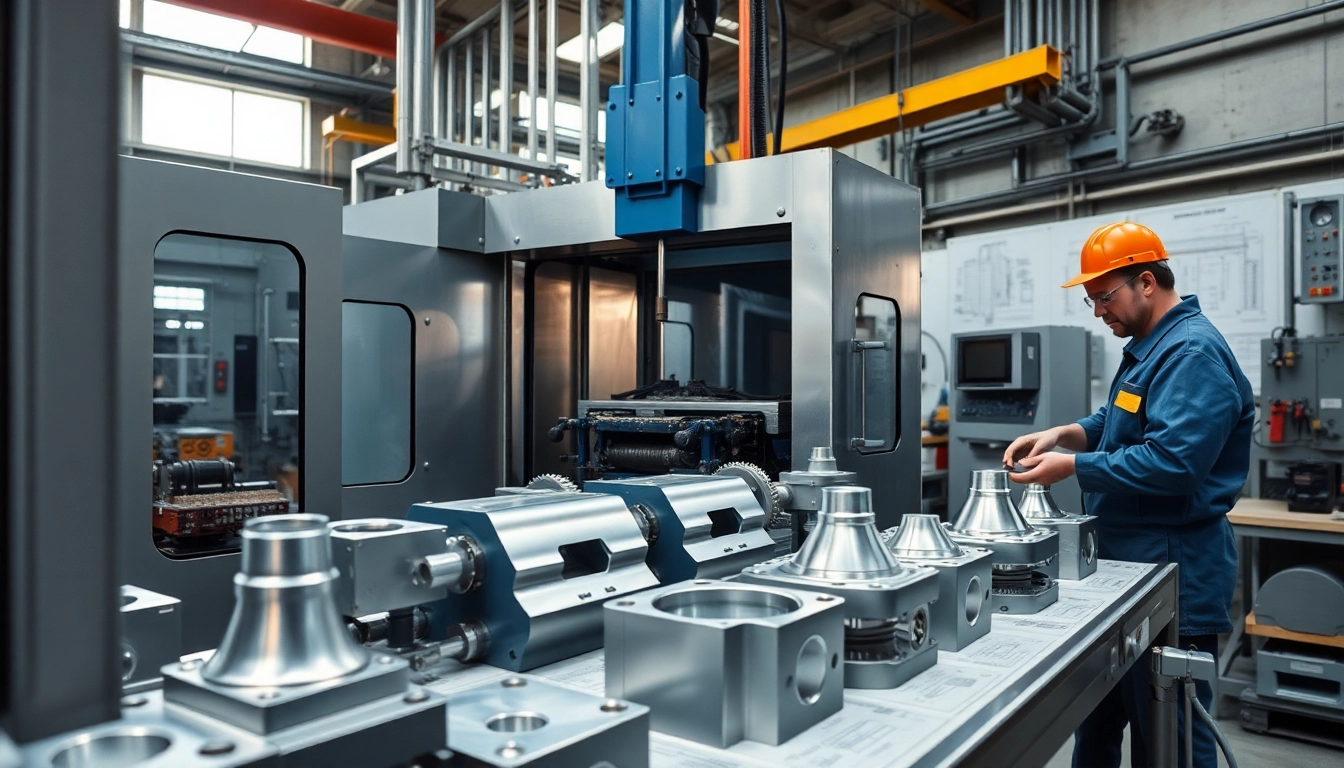Understanding Aluminum Die Casting in Malaysia
Aluminum die casting is a crucial manufacturing process used extensively in various industries due to its strength, lightweight properties, and durability. In Malaysia, the industry has flourished, establishing the country as a significant player in the global aluminum die casting market. Offering a unique blend of advanced technology and skilled craftsmanship, Malaysian manufacturers provide businesses with essential components that meet high performance and quality standards. When exploring options, aluminum die casting malaysia stands out as a reliable source for quality solutions.
What is Aluminum Die Casting?
Aluminum die casting is a manufacturing method that involves forcing molten aluminum alloy into molds under high pressure. The process allows for the production of complex shapes with excellent dimensional accuracy and surface finish. This method is particularly favored in industries like automotive, aerospace, electronics, and consumer goods where precision and a high-quality finish are critical. The die casting process typically consists of several stages, including die preparation, melting, pouring, and cooling, which ensures the creation of intricate geometries.
Key Benefits of Aluminum Die Casting
- High Strength-to-Weight Ratio: Aluminum die-cast parts are lightweight yet strong, making them ideal for various applications.
- Excellent Surface Finish: The process yields components with a smooth surface, reducing the need for secondary machining operations.
- Complex Shapes: Capable of producing intricate designs, aluminum die casting allows for greater design freedom.
- Cost-Effective: With high production speeds and minimal material waste, die casting can significantly reduce manufacturing costs.
Industry Applications of Aluminum Die Casting
Aluminum die casting is utilized across numerous sectors, including:
- Automotive: Manufacturing engine blocks, transmission cases, and various other components.
- Aerospace: Components for aircraft structures that require lightweight materials.
- Electronics: Housings and fittings for consumer electronics, providing protection and reducing weight.
- Consumer Goods: Producing durable items like power tools and kitchen appliances.
Choosing the Right Manufacturer for Aluminum Die Casting Malaysia
Selecting a reliable manufacturer is crucial for quality assurance and long-term partnerships. Factors such as technological capabilities, experience, and compliance with international standards should be thoroughly evaluated. Companies like Sena Diecasting and others lead the way by adapting innovative practices and ensuring consistency in their product offerings.
Evaluating Manufacturer Capabilities
When assessing potential manufacturers, consider their production capabilities, technology adoption, and quality control measures. Look for companies that invest in modern die casting machinery, as well as those that maintain stringent quality assurance protocols. Additionally, understanding their experience in specific industries can provide insights into their expertise in handling unique customer requirements.
Current Trends in Malaysian Die Casting
As the Malaysian die casting industry evolves, several key trends have emerged:
- Automation: Increased automation in production lines to enhance efficiency and reduce labor costs.
- Sustainability: A focus on eco-friendly practices, such as recycling scrap material and reducing energy consumption.
- Advanced Alloys: Development of new aluminum alloys that improve performance and resistance to corrosion.
Comparing Local and International Manufacturers
While international manufacturers may provide advanced technology, local firms often offer competitive pricing and personalized service. Local expertise in manufacturing standards and customer preferences can lead to faster product development and greater adaptability to changes in market demands. Businesses looking for aluminum die casting solutions should evaluate both local and international options before making a decision.
Best Practices for Quality Control in Die Casting
Quality control is paramount in the die casting process to ensure that the final products meet or exceed customer expectations. Implementing best practices in quality assurance can minimize defects and enhance overall quality.
Implementing Effective Quality Assurance Strategies
Establishing a robust quality assurance framework involves regular inspections at each stage of production, from material selection to the final output. Techniques such as statistical process control (SPC) can be utilized to monitor processes and identify variations that may lead to defects.
Technology and Automation in Quality Control
The integration of technology in quality control processes has revolutionized how manufacturers operate. Automated inspection systems using advanced imaging techniques and machine learning algorithms can detect imperfections quickly, ensuring high standards of quality are maintained.
Real-World Examples of Quality Success in Die Casting
Companies that have successfully implemented rigorous quality control measures have seen reductions in rework costs and improved customer satisfaction. For instance, manufacturers that utilize real-time monitoring and feedback systems have reported significant improvements in defect rates, leading to higher overall efficiency.
Addressing Challenges in Aluminum Die Casting
While aluminum die casting offers numerous benefits, several challenges must be addressed to ensure optimal production outcomes. Understanding these challenges allows manufacturers to implement effective solutions.
Common Misconceptions About Aluminum Die Casting
One prevalent misconception is that aluminum die casting is suitable only for high-volume production runs. In reality, this method can be adapted for small and medium-scale productions, especially when utilizing advanced mold-making techniques.
Identifying and Overcoming Technical Challenges
Issues such as defects caused by gas entrapment or incomplete mold filling can pose significant challenges. Employing simulation software during the design phase can help predict potential issues and optimize mold designs accordingly. Furthermore, ongoing training of personnel in handling equipment and new technologies is critical to maintaining high production standards.
Environmental Considerations in Die Casting Manufacturing
Manufacturers must comply with environmental regulations while minimizing their ecological footprint. Adopting green manufacturing practices, such as utilizing energy-efficient machines and recycling materials, not only meets regulatory requirements but also enhances brand reputation and customer loyalty.
Future Trends and Innovations in Aluminum Die Casting Malaysia
Looking ahead, several trends and innovations are poised to shape the future of aluminum die casting in Malaysia.
Predictions for 2025 and Beyond
By 2025, the Malaysian die casting industry is expected to embrace more advanced technologies, such as artificial intelligence and IoT (Internet of Things) for predictive maintenance and operational efficiency. This shift will significantly enhance production capabilities and ensure that manufacturers can respond quickly to market demands.
Emerging Technologies in Die Casting
Emerging technologies, including 3D metal printing and improved simulation software, will revolutionize the design and manufacturing processes. These innovations will enable the production of components with complex geometries that were previously unattainable using traditional techniques.
Strategic Insights for Competitors in the Industry
For companies operating in this space, strategic partnerships with technology providers, investment in R&D, and a strong commitment to sustainability will be key differentiators. By focusing on these areas, manufacturers can gain a competitive edge both locally and globally.

